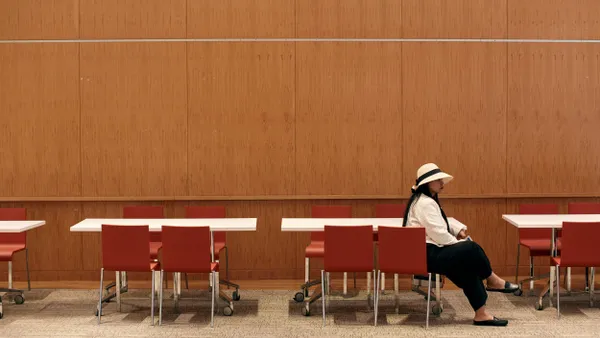Dive Brief:
- Virtual reality meets soft skills training in a new "virtual human technology" tool announced last week by business solutions firm Talespin. The company said its VR soft skills training tool helps staffers participate in real-world situations via a "a safe, repeatable learning environment" to improve their communication, empathy and leadership qualities.
- Learners interact with virtual human characters in a variety of scenarios. In a demo example, trainees interact with an employee who is being let go; the scenario is meant to teach trainees how to manage the stress and emotion of the situation and navigate the pitfalls of a termination meeting. Using AI, natural language processing and other techniques, Talespin said the tech simulates realistic, body speech and mannerisms to provide feedback to trainees.
- "Improved workplace communication and empathy are the most critical factors we've identified as we help organizations think about the future of work," Kyle Jackson, CEO and co-founder of Talespin, said in a statement. "With this platform, we're empowering people to become better managers, colleagues, and communicators, and in turn, helping our customers unlock innovation and growth."
Dive Insight:
Soft skills are increasingly being viewed as a potential indicator of job fitness and have therefore become a key area of learning efforts for businesses in recent years. However, the ability to communicate effectively, lead others and adapt to change may be among the hardest skills to identify, according to a recent LinkedIn report. The company found skill areas like leadership, oral communication and time management constituted the largest skills gaps.
Talespin's newest solution isn't the first to bring virtual reality to employee training. The technology can drill workers on real-world work tasks like food safety, and other employers have attempted to train for interpersonal skills as well. As recently as last year, Walmart began using VR to train staff members to prep for Black Friday and the hectic holiday shopping season with simulations of the noise, crowds and pandemonium workers would likely experience. And for good reason: One report found that multi-sensory learning experiences like these can boost knowledge retention.
VR may eventually take training beyond these specific, acute scenarios to more generic experiences that workers are more likely to experience on the job, like how to use equipment safely. Improving soft skills could prove to be just as valuable.











